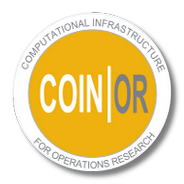A New Chapter: COIN-OR and NVIDIA cuOpt Join Forces for Open-Source Optimization
Optimization has always been at the core of computational research, and now, a new frontier is emerging—one where open-source innovation meets GPU acceleration. COIN-OR and NVIDIA are collaborating to bring NVIDIA cuOpt, a GPU-accelerated optimization engine, into the COIN-OR open-source ecosystem. This collaboration aims to empower researchers, developers, and industry leaders with cutting-edge tools to drive breakthroughs in large-scale optimization.
This is more than just an open-source release—it’s about fostering a dynamic, community-driven ecosystem where experts can push the boundaries of optimization, explore novel GPU-powered techniques, and accelerate real-world impact.
The COIN-OR Foundation: A Legacy of Open Innovation
The COIN-OR Foundation was born out of a need: By the late ‘90s, optimization research was advancing rapidly, yet the lack of open-source software was slowing progress. In 2000, IBM launched the COIN-OR Initiative to change that, providing a public repository of open-source tools for optimization. By 2004, COIN-OR had grown into an independent, nonprofit educational foundation, dedicated to fostering a thriving, community-driven ecosystem for computational operations research.
Today, COIN-OR has evolved into a global hub for open innovation, hosting over 70 projects on GitHub and supporting thousands of researchers and practitioners worldwide. As a strategic partner of the Institute for Operations Research and Management Science (INFORMS) Computing Society, COIN-OR organizes annual competitions, workshops, and fosters the development of major open-source projects such as Cbc, Ipopt, and HiGHS. Our mission remains steadfast: to provide the tools and platform for optimization researchers to push the boundaries of computational science.
New Frontiers in Optimization: GPUs and Machine Learning
As the algorithms for workhorse problem classes, such as mixed-integer linear optimization, have matured, the focus of computational research has shifted towards leveraging existing solvers as black-box tools for tackling increasingly complex problem classes, such as multi-stage stochastic optimization, robust optimization, and bilevel optimization.
The rise of machine learning and GPU acceleration has now created new opportunities to reimagine optimization algorithms. By harnessing the massive parallelism of GPUs, classical optimization methods—such as continuous linear optimization—are being revolutionized, enabling faster, more scalable solutions. Early indications suggest that GPU acceleration could lead to entirely new algorithmic breakthroughs, transforming how optimization problems are solved.
Forging a Strategic Collaboration: COIN-OR and NVIDIA cuOpt
At COIN-OR, we believe in building on the past to shape the future and our partnership with NVIDIA marks a milestone in the evolution of open-source optimization. We are thrilled to collaborate with NVIDIA as it releases NVIDIA cuOpt—its GPU-accelerated optimization algorithms—under an open-source license, making it available within the COIN-OR repository.
This partnership isn’t just about making cuOpt open source—it’s about building a vibrant research and development environment, where COIN-OR and NVIDIA will co-sponsor implementation challenges, host dedicated sessions at major conferences, and engage with the broader COIN-OR community.
By combining NVIDIA’s GPU expertise with COIN-OR’s deep roots in open-source optimization, we aim to fuel innovation, accelerate research, and reimagine new possibilities in large-scale optimization.
This is just the beginning. We look forward to the groundbreaking discoveries that will emerge from this partnership. If you are a researcher, developer, or industry leader passionate about optimization, now is the time to get involved—join us as we embark on this exciting journey!
